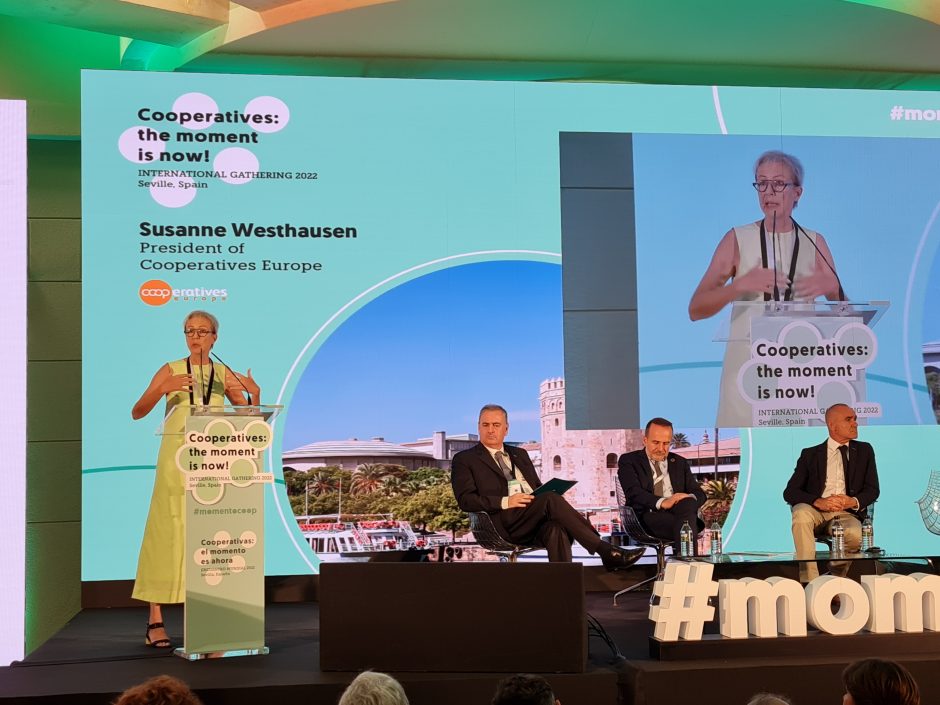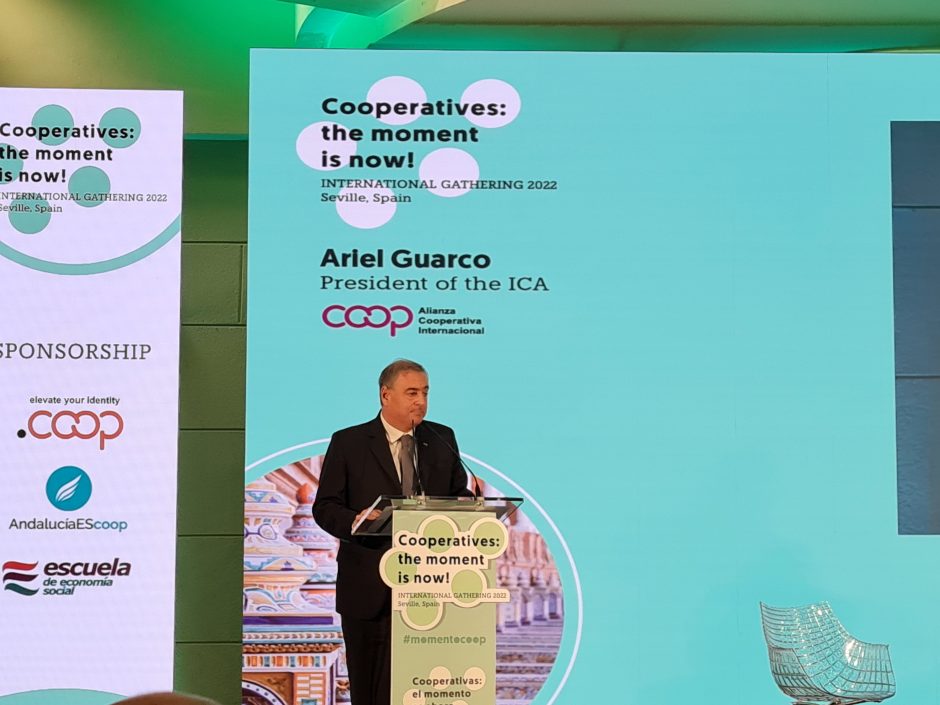Over 700 co-operators from around the world are meeting in Seville today for the General Assembly of the International Co-operative Alliance.
They were welcomed to Seville, the capital of Andalucía, Spain, by the city’s mayor, Antonio Muñoz, during a side event organised by the Spanish confederation of worker co-operatives (COCETA) with the theme “Co-operatives, the time is now!”
Mr Muñoz praised co-operatives for their economic contribution to his city, which is home to 230 co-ops that employ 2,900 people. He said the sector plays a key role in diversifying the economy but this is not always recognised; the conference, he added, will hopefully help to raise awareness of its contribution.
Participants also saw a video message from Yolanda Díaz, second deputy prime minister and labour and social economy minister in the national government, who noted the fundamental role of co-ops in reducing inequalities, promoting decent work and protecting the environment.
Her government runs a number of initiatives to promote co-ops, she said, including the Strategic Project for the Recovery and Economic Transformation (PERTE) of the Social Economy and Citizens. Adopted in May, this pledges to develop the social economy and carry out an accessible, people-centred transformation of the care sector. As people-centred enterprises rooted in their communities, with a long-term vision, co-ops also help to promote democratic governance, she added.

Susanne Westhausen, president of Cooperatives Europe, said co-ops need to win the battle of ideas with other enterprises – and also get better at “walking the talk” by collaborating more and financing new co-ops: “We need to demonstrate our results and do it together.”
Youth engagement is also a priority, she added, warning: “If we are not engaging young people, we will no just lose he battle of ideas, but our movement … The best way to move forward is by empowering people through education and democratic participation. So yes, the time for co-operatives is now.”
ICA president Ariel Guarco continued the theme, telling the assembled co-operators they have reasons to be optimistic about the future.

“If we want to face global challenges we know none of them can be solved without involving local communities. That is where we come in,” he said. Hope can bring a transformational power, he added – and “co-ops can give hope through a social, economic and environmental development model that looks after people and the planet.”
There were also representations from the autonomous government of Andalucía. Rocío Blanco, acting minister of employment, training and self-employment for the Andalucia government, said co-operatives are a priority for region, which has the highest number of co-operatives – 4,000 – 80% of which are worker co-ops. They employ 59,000 people.
In a video message to the conference, the president of Andalusia, Juan Manuel Moreno, also highlighted the sector’s importance to Andalucía’s economy.
Panel discussions
In addition the opening session featuring the city’s Mayor and Andalusia government officials, the conference included panel discussions, workshops and visit to local co-ops.
The first panel looked at the current state of the co-operative sector and the wider social economy in Spain and around the world.
Iñigo Abizuri, president of CICOPA and chief of Public Affairs at Mondragon Corporation, said: “We need to democratise enterprises, we cannot talk about workers like they are interchangeable and we need to look after the planet, but there is hope, there is a model that does this co-ops, that is why the time is now.”
Juan Antonio Pedreño, president of Social Economy Europe and the Spanish Social Economy Employers’ Confederation (CEPES) highlighted the need for co-operatives to raise awareness about their business model.
He thinks this can be done within the conversations about the social economy.
“The Social economy is now talked about, something that was not the case in the past. The objective is to grow a movement based on values,” he said.
Carlos Zarco, president of the International health Cooperative Organisation (IHCO) y Fundación Espriú in Spain, highlighted the important role health co-operatives play in providing access to health services.
“Because they exist in so many countries, co-ops in a position to have a global answer to challenges. Health co-ops give access to health services to over 100m people,” he said.
Maravillas Espín, general director of Self-Employment, Social Economy and RSE of the Ministry of Labor and Social Economy said that the Next Generation EU economic recovery package to support the EU member states to recover could be an opportunity for co-ops – the plan could enable the use of public resources to support actors such as co-ops and social economy, she said. Public-private partnerships are another opportunity for co-ops, she said.
“I think co-ops are ready and the government is too, and these alliances will bring great benefits,” agreed Mr Abizuri.
He explained that in the Basque Country universities, co-ops and government meet on a regular basis.
“The world has never needed to improve more than now. Let’s build more co-operatives, please!” he said.
He added that it was important for the plan to have objectives regarding co-ops, “ We need more co-ops and more larger co-ops as well,” he said, adding that Spain is known as a tourism country with tourism contributing 12% to its GDP. “Co-ops contribute 10% to Spain’s GDP and people don’t know it.”
Mr Pedreno explained that five years ago the social economy started benefiting from EU structural funding. He said Spain was the first in Europe to give priority to the social economy when allocating structural funding, €40m have been allocated through this to the social economy with €70m more to be allocated over coming years, he said.
He called on co-ops to work with other social economy actors to raise awareness about the sector.
The second panel looked at what the future could look like for co-ops.
“We have a unique opportunity to dream, to build a more participative and sustainable future,” said Malena Riudavets, vice-president of COCETA.
Leire Mugerza president of the Congress at the Mondragon Corporation praised co-ops for maintained work during the pandemic, providing loans and essential services and committing to decent work.
“What societies need is what we’ve been doing all our lives,” she said, adding, “We don’t have to recreate the model, it is there.”
Trebor Scholz, associate professor of Culture & Media, New School (NYC), argued that co-ops needed “a vision that is bigger than the immediate needs for co-ops.” He believes what is needed is an economy rooted in many organisations, including co-ops, unions, small private companies and organisations owned by municipalities. “All these are complementing each other to promote well being,” he said. He added that platform co-ops need supporting regulatory environments in order to thrive. He also called for more partnerships between existing co-ops, unions and social movements.
Graciela Fernández, president of ICA-Americas said that co-ops can also use the UN Sustainable Development Goals to express what they are doing in terms of social innovations. She also called for more statistics of co-operatives, particularly on their role in empowering women.
“We need to visibilise the invisible,” she said. “The ICA-EU Coops4Dev Project project gave great visibility to co-ops, enabled them to be at the table and we must continue to lobby for co-ops to be taken into account,” she said.
This article has been amended to update the name of a panelist.